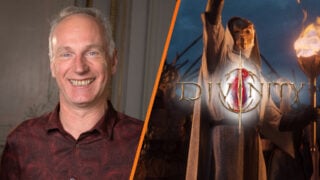Cyberpunk’s Mike Pondsmith: ‘My wife guessed they had Keanu Reeves’
Writer and designer discusses seeing his creation brought to life

Mike Pondsmith is the American tabletop and video game designer behind Cyberpunk. He’s also an incredibly affable man who loves nothing more than sharing anecdotes. As first interviews of E3 go, this is right up there.
Pondsmith created Cyberpunk in 1988 with a pen and paper RPG, later renamed Cyberpunk 2013. He tells VGC that seeing something he created more than 30 years ago brought to life in upcoming game Cyberpunk 2077 is “amazing,” “weird” and “a little intimidating as well.”
The writer and designer has a unique role as a licensor. His background in video games (he worked on the launch of the original Xbox) allows him to give direct feedback to developer CD Projekt Red and he claims to have a personal relationship with many people on the team.
“When I walk through their building and see the 500+ people on the teams, I’m waving at friends all the time,” he says.
VGC was fortunate to spend 30 minutes with Pondsmith to discuss Cyberpunk 2077’s recent E3 showing, the universe behind the game and his aspirations for the future.
What’s it like to see your creation ‘brought to life’ in video game form and for it to receive such a great reception?
It is very weird, because I see all this ability and talent put together to bring something that I did to life. Seeing people get behind it is just amazing. But it’s a little intimidating as well.
I’ll give you an example: I have a bunch of logos that we use and I made those one night – my background is in graphic design – because I needed to fill an area in the original Cyberpunk. So I sat with matt paint or whatever and went, ‘zip, zip, zip’. So to see those logos that I did in 3D, on walls, people wearing them on their clothes… it’s really strange!
If I knew these guys were going to use those, I would’ve made better logos!
Keanu Reeves coming out at the Xbox E3 briefing must have been a special moment for you?
Well I knew for several months about it, which was funny. They basically wanted to sneak it up on me the next time I was out in Warsaw with my team. My wife guessed it the night before. I said they had an actor they wanted me to see for Johnny Silverhand and she looked up and said, “it’s Keanu Reeves.” And I said, “nah, they’ll never get Keanu Reeves! He doesn’t want to do cyberpunk stuff again.”

Was it just a good guess?!
My wife has an ability to make guesses like that. So we’re sitting there at CDPR and they’re about to tell us. They go, “can you guess who it is?” And my wife goes, “yep, Keanu Reeves” and they looked heartbroken. I had to reassure them, “no, no – that’s really cool! You really got him!”
So we knew about Keanu and we also knew the release date. I lurk on Reddit quite a bit and here I am with people chucking all these theories at me about the release date, and I’m thinking, ‘I can’t tell them!’ For me it was it was really cool. There was this immense set of satisfaction that people thought they’d figured it out, but they didn’t figure it all out!
Have you had a chance to meet Keanu?
No, no. He showed up to the show and then I guess he took off. He’s recorded a bunch of stuff, I’ve gathered, but I’m up in Washington and he’s wherever he is, so no chance.
“I said they had an actor for Johnny Silverhand and my wife looked up and said, ‘it’s Keanu Reeves.’ I said, ‘nah, they’ll never get Keanu Reeves! He doesn’t want to do cyberpunk stuff again.'”
Do you think April is a good time to release Cyberpunk 2077, months before the arrival of new consoles?
I think it’s still a pretty good place. Frankly, nobody wants to wait to see this game coming on new systems. But to be honest, they will upgrade the path. It’s already got elements probably built into it. I’ve not seen the code, but my assumption is that there are elements that can move forward to the next versions.
Knowing what I know about system development, they probably have dev kits out already. I know that there are dev kits for Scarlett around now… when I worked at Xbox there was a year [in advance] of original Xbox dev kits. I still have one sitting in my garage! So yeah, there are people already working on them so most likely what will happen is they’ll look at how they’ll upgrade within that.
What interests you in video games as a medium?
Well firstly, I started out there. I was creating graphic design and ended up working for a video game company called California Pacific, working years and years ago on essentially the original Ultima games. So I’d originally gotten into video games and I actually got into pen and paper games by mistake more than anything: I had this idea for this giant robot game. I went to show it to my hero [game designer] Steve Jackson and people liked it. The next thing I knew I had a game company.
The thing that I love about video games is that as we get better and better at production, we have the ability to build not just immersion, but to build worlds that extend beyond even the storylines. They become places that are loved by many, many people and places of creativity, which players can enter. For example, I am utterly amazed by how, just on the strength of our trailers, how many people have done cosplay, music, posters… there’s a guy building a car from the original video. He’s building the damn car!
You can create worlds to a certain extent with paper, but you can never get that visceral, 3D feeling that you can with a video game. That’s what makes it very powerful: you can make worlds.

Cyberpunk the series has existed for over 30 years. Do you think Cyberpunk could have been done justice before now in video game form?
Yes, but that’s not why it’s working now. The reason is that from the start CDPR are fans: they play the [pen and paper] game. Many of them grew up playing the game. So this is like a bunch of guys who watched the Star Wars movies as kids and then got a chance to make a Star Wars game: they would do the best damn job they could.
That is why we went with them. This game has been optioned for years to many, many different studios. But what I saw in CD Projekt was that they really cared about it and the things that were important to us were important to them. So I knew it was in good hands.
We have a unique take on the cyberpunk genre: it’s a heroic kind of cyberpunk in this sort of dirty, gritty way, but you can still be the hero. That’s unusual for the genre and a lot of the game companies who have been interested before saw maybe the Blade Runner-esque qualities, but they didn’t see the weird, fun and dangerous, risky elements. It’s hard to describe. It was the ethos of the 80s, that a lone person with a gun and an attitude could change the world.
How faithful has CDPR been to your original vision?
Oh yeah. And unlike many people who are licensing, I’ve worked in video games. So that means I could give the development team some useful input about how to do it. I’ll give you an example: we talked about the AV’s, which are the flying cars, and I had worked on Flight Simulator so I could bring that to the table and tell them what to do and what not to do for 3D flight.
“This game has been optioned for years to many, many different studios. But what I saw in CD Projekt was that they really cared about it and the things that were important to us were important to them. So I knew it was in good hands.”
What does Cyberpunk have to say about the current state of the world?
I tell people that Cyberpunk is a warning, not, ‘hey, this is going to be great.’ We are getting technologies now that are outstanding, things that I thought would be way out of our reach before 2020. For example, we have a group of people who are going to be featured in our next edition and they have cyberware hooked up. They’ve got cyber arms and legs and they look like characters from Cyberpunk. We have that capability.
So if we have that, what are we going to do with it? How are we going to make the world work? How are we going to make sure that the right people use that technology responsibly? Do we really want corporations structuring how our lives work? Right now we have corporations that follow us everywhere. It’s important for us to think where we’re going with this capability.
Do you think it’s important that entertainment like this asks those sorts of questions?
Oh yeah. Somebody asked me a while back if Cyberpunk was political and I said inherently it’s always political. It’s not politics in terms of right or left, or even conservative versus liberal… everything is political. Human beings are political. First we got food, then we got prostitution, then we got politics. And we might have gotten politics before prostitution, but I’m not sure.
Basically, it’s all political but a big part of what Cyberpunk talks about is the disparities of power and how technology readdresses that. I’ll give you an example: when I started my paper game business in the 80s, we had to go and get stuff printed and we had to go to specific areas to have films made. It cost us a lot of money and the people doing it set our timetables, how much we paid… we had very little control.
Within two years my art director, who was also an engineer, had redesigned personal scanners to be better than the ones we used to go to and we could now do all of that stuff in-house. Benjamin Franklin once said the printing press belongs to those who own one. Well, I owned one.
Technology has created levellers. YouTube is a leveller in many ways, because I don’t have to go to some network to get a TV show made. Flash was a leveller: I didn’t have to go somewhere and get a toy license to get an animation made. Suddenly I can do radical, interesting and heavily political things because technology is my enabler.

How much scope is there for more stories in the Cyberpunk universe?
There are tons of them. One of the things that we’re doing now is that we look at Cyberpunk the series as essentially a trilogy much like Star Wars, or the different generations of Star Trek. 2013 was about a world that was recovering and learning to use new technology. 2020 was a world in which corporations were supreme and abused that power tremendously. The new book we’re doing at Talsorian, Cyberpunk Red, is about how people recover from that screw-up, take the wheel for themselves and redirect where they’re going to go.
A lot of 2077 is about that push between people who want to gain power from the corporations and their groups, and the people who have had a taste of their own freedom and are not going to go along with this. So right now Talsorian is running the Empire Strikes Back, while 2077 is essentially Return of the Jedi or beyond even. There are a lot of stories to tell there, if you don’t keep them to a specific group of characters, if you recognise that there are a lot of people with a lot of interesting stories.
And you’re not fussy about what medium those stories are told in?
No. I’ve recognised over the years that you have to adapt to the medium to make it effective. You don’t use one medium the same way you use another. What I do with tabletop is very different from what I would do in a video game. Having to go between the two of them now, I can see that there are things that are easy to do in tabletop that I would never try to do in video games, but there are things in video games that have much higher impact than they’ll ever have in tabletop. And that will change if we ever do a film for this thing. What I expect to see will be different.
The trick for all of us involved in the project is to make sure than it sticks to a certain set of roots. If you look at the game logo, it’s basically version four of something I drew 30 years ago, in the middle of the night with my own hand writing. But the roots of it, the choices of how the font goes together, how it’s broken up… that’s carried forward.
“I can’t really say anything [about movie rights]. But with Keanu Reeves being tied up in things, it’s become much more of a possibility.”
Are you actively optioning the Cyberpunk movie rights?
I can’t really say anything on that. But with Keanu Reeves being tied up in things, it’s become much more of a possibility.
At this point we are teaching people about this new kind of cyberpunk. My favourite film is Blade Runner, but I recognise inherently that it’s a cerebral film and 2049 was even more cerebral. A cerebral film is not necessarily going to allow other people to enter that space and understand it, but at the same time you don’t want to do it totally action.
We found a sweet spot with Cyberpunk which is, we make you think, but we don’t bog you down and give you an education. At the end of the day, there will be a moment when you’re sitting there as V and you’ll look down and realise that both of your hands are essentially cybernetic tool factories. As a player, you should at some point think, ‘what is that like?’ There should be that moment of discomfort.
Would you like to continue working with CD Projekt Red?
I hope so. Lord knows we’d do more of these if we can sell a few copies. Our relationship started with the fact that they’re fans and they are, as my business manager likes to say, “they’re like us.” At the core, they’re people who are honourable, straightforward, care deeply about what they do for who they’re creating for. All of us are very much driven by what fans will get out of this, because we are fans.
I have so many friends there that if I didn’t have a company in Seattle, I would probably move to Poland and hang out. When I walk through their building and see the 500+ people on the teams, I’m waving at friends all the time.














